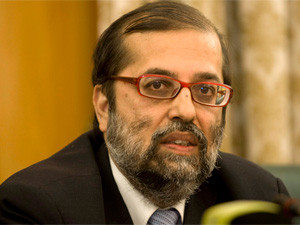
MultiChoice has declared itself "extremely disappointed" at communications minister Yunus Carrim's response to its open letter over set-top box controls, while the South African Communications Forum (SACF) has also waded into the fray.
Last year, Carrim decreed that subsidised set-top boxes would have a built-in control system, but that broadcasters could choose whether to implement the system on their side. However, the matter has yet to be resolved, with several parties taking up positions on opposite sides of the fence.
As a result, government has not been able to issue the tender for subsidised decoders - for which it has set aside around R2.3 billion - and will not be ready to officially turn on digital television on 1 April.
MultiChoice has issued a statement in which it urges the minister to "put the interests of consumers first", arguing an unencrypted set-top box option has multiple benefits to South African television viewers.
The satellite provider alleges Carrim has disregarded its views, adding: "It is clear that, like everywhere else in the world, an unencrypted option is not only the best low-cost option in terms of initial outlay, but is cheaper in terms of ongoing costs to consumers."
Endless delays
Digital television is meant to bring with it a host of benefits, including more channels and additional spectrum that can be used to roll out long-term evolution in rural areas. However, SA seems increasingly likely to miss the International Telecommunication Union's mid-2015 deadline, which is when it will stop protecting analogue signal.
The department is working towards meeting this time frame, but the issue of set-top box controls has held up the matter for more than a year. At the weekend, the Association of Community Television SA, MultiChoice and the National Association of Manufacturers in Electronic Components disputed the necessity of a control system.
In an open letter to Carrim published in the City Press and Sunday Times, the three organisations outlined "serious reservations" about controls, saying this system had been "universally rejected internationally" as it makes migration more expensive.
In response, Carrim said the three parties had raised the same "old, tired issues" and called the advertisement "astonishingly inaccurate". He said it "serves to substantially weaken the case of those opposed to the government's policy".
Carrim said the policy on control was consistent with the African National Congress' Mangaung resolutions, and government's policies on encouraging competition in monopolised sectors, empowerment, job-creation, and advancing the needs of the poor and disadvantaged.
In addition, the minister said several other countries - such as Zambia, Uganda, Botswana, Ethiopia, Seychelles, Malawi, Nigeria, Namibia, Tanzania, Kenya, Malaysia, Ukraine, Belarus and Slovakia - are using controls. "If we drop control, the rollout will be delayed by a year - and we were supposed to launch in September 2008."
Carrim added "the doors to negotiations remain open. But we need to finalise matters very soon. We are over five years behind schedule with digital migration."
Department spokesman Siya Qoza says, in response to MultiChoice's latest missive, consultations on decoder issues have been taking place since 2008 and the satellite provider was part of these talks.
Qoza adds: "Even a facilitation process initiated by Carrim, from September 2013 until 17 March 2014, failed. All the issues raised by MultiChoice were fully addressed in this process." He notes controls have been Cabinet policy since 2008.
Misleading
Meanwhile, the SACF has added its bit to the debate, saying the triumvirate's advertisement "unduly seeks to cast aspersions on minister Carrim's bona fides". It says the ad "is misleading to those South Africans who might not be aware of all the behind-the-scenes negotiations, interests and facts at the heart of this issue".
The SACF says a control system will save consumers money in the long run, because it allows for over-the-air software updates. The association also argues controls will not harm free-to-air broadcasters, because the policy does not in any way require any broadcaster to encrypt their signal.
In addition, says the forum, Kenya's move to drop controls led to a flood of cheap imported decoders that had a high percentage of failures. It adds including controls will "promote industrial development, television consumer protection, enhance job creation, access to information, and advance the ideals of economic transformation".
Share